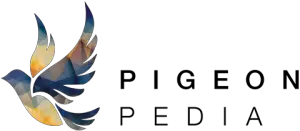Pigeons may be used to close contact with humans, but unless they are pets, they are usually wary of people. If the pigeon doesn’t attempt to fly or walk away as you get close, then something is definitely wrong. Here is how to approach an injured pigeon and how to care for it.
As an Amazon Associate we may earn a small commission on purchases made through any Amazon links, this helps support us, thank you.
Looking after a pigeon for the first time?
Click to view essential products to help you take the best care of them.
If you come across a pigeon that is obviously in distress or is staying still and not moving then the lack of an escape attempt indicates that something is wrong with them.
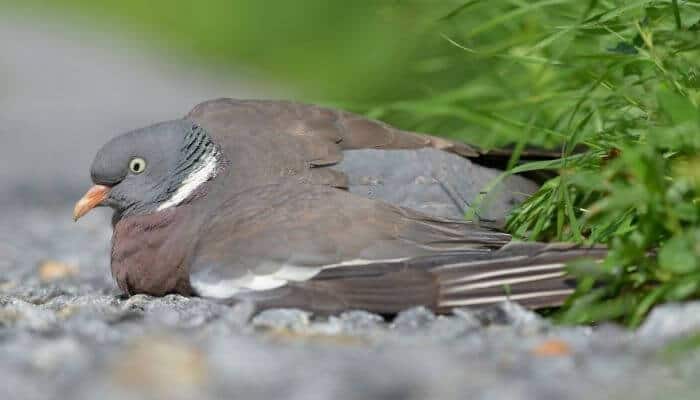
It could be a broken wing, it could be exhaustion from long-distance flying or something else altogether.
Here’s what you should do if you find an injured pigeon:
1. Approach slowly and pick it up with care
Gently does it as you don’t know the extent of its injuries unless they are highly visible and obvious.
If you take it home, place it in a box that it can’t escape from.
A wild pigeon will probably be terrified by being handled by a human.
To avoid further injury put in something that is difficult to get out of.
If you have a pigeon cage handy, that will serve well.
2. Place it in a darkened location
For some reason, darkish places tend to soothe the bird, as it will be full of anxiety from being handled.
If you have placed it in a cage, simply cover it with a blanket.
3. Keep them warm
Surrounding the pigeon with something warm and soft is a good idea to help put them at ease.
If you are a pet owner, you may have some kind of warming pad. Cover the warming pad with a cloth before placing the pigeon on it.
Alternatively, a blanket and a warm (not too hot) hot water bottle is a good option.
4. Give them something to drink
They may be dehydrated so offer them a drink.
To give them some extra energy, offer them a solution of a little warmed-up water with a pinch of salt and sugar.
Make sure it is stirred so both are dissolved entirely and then place it in front of the pigeon.
Use a deep container as pigeons immerse their beaks almost completely to drink and suck up liquids.
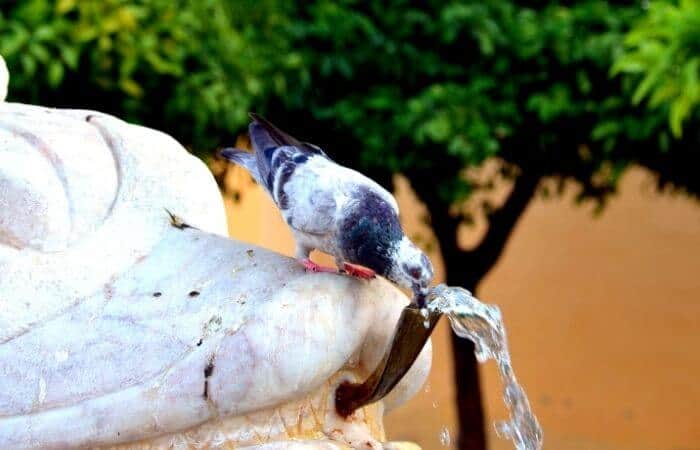
5. Give Them Some Food
You may never have kept a pigeon before so are wondering what to feed an injured pigeon.
The best food for Pigeons, regardless of whether they are injured or not, typically consists primarily of seeds and grains.
If you don’t have anything like that to hand a bit of bread will help perk them up, however, don’t feed them this for more than a day as it is essentially junk food for pigeons and won’t do them any favors long term.
If the bird doesn’t drink or eat, then that is a sign that something is seriously wrong.
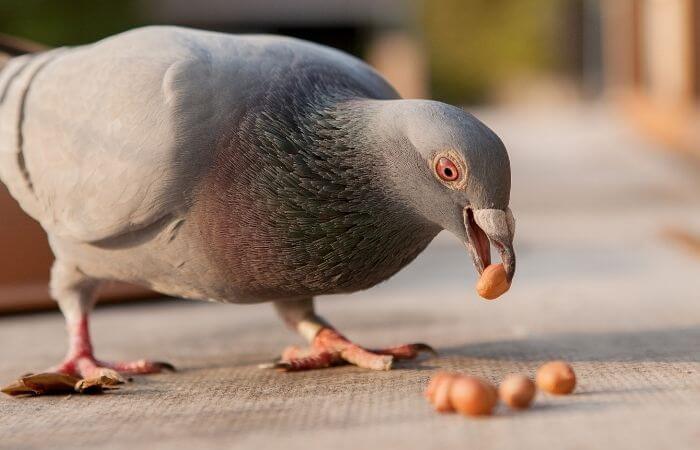
Pigeons are gluttons that eat more than they drink. They eat continuously, so one that refuses food or drink must be in a bad way.
Beware of doing more harm than good
Anyone finding an injured bird should certainly check them over for physical signs of injury.
If there are obvious wounds, then the best step is to take them directly to a vet.
When you can’t find obvious injuries, then you can take the steps outlined above to help the bird recover from whatever ails it.
Handling a pigeon in the hope of helping it may not always be the best answer.
As with humans, the best advice may be not to disturb the bird unless you know the real extent of its injuries.
That may make things difficult depending on where you find the bird. You can’t call an ambulance for an injured bird.
Veterinarians don’t make house calls unless they are the kind that specializes in large animals.
Unfortunately, this seems to be a case of damned if you do and damned if you don’t.
A kind-hearted response
If you are unable to just walk away, you will probably end up taking the pigeon home.
After you have made the bird comfortable in a secure place, your best bet is to seek advice.
It is better to phone around the local veterinarians to see which would have an interest in treating an injured pigeon first.
Some don’t and that will save you time, plus prevent you from maybe adding further injury to the bird by moving it around.
Also, a vet will charge you for the consultation and treatment.
Some will simply tell that it needs to be put to sleep.
Of course, this would depend on the extent of the injuries and the diagnosis.
The internet may be a greater source of information.
There are numerous pigeon forums where pigeon fanciers can give you advice.
Alternatively, there are animal sanctuaries, rescue centers and animal hospitals listed online.
Reasons pigeons get injured
The natural predators of pigeons are falcons and other birds of prey.
These are top-of-the-food-chain predators that rarely let their prey escape.
Pigeons may be adroit aerial acrobats, but so too are the predators.
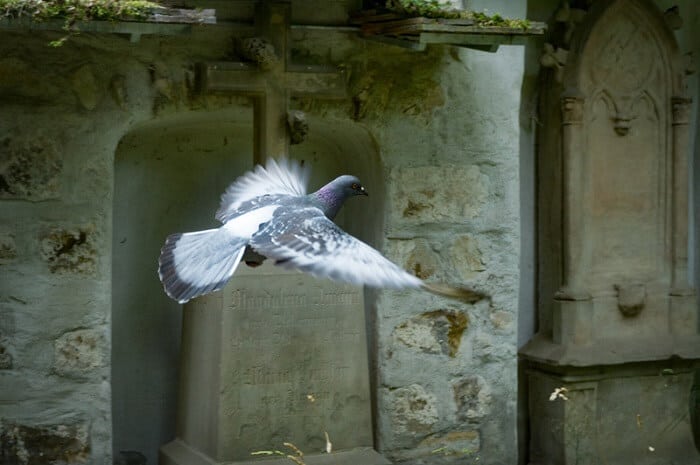
It is possible that a lucky pigeon may evade death but come away injured.
Other animal predators include cats and rats.
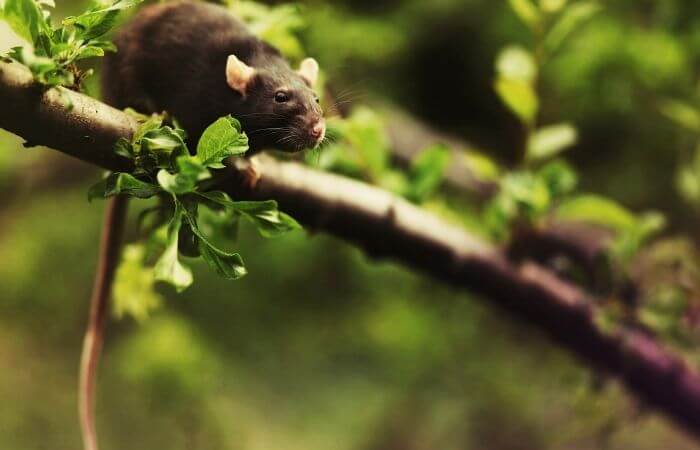
Rats, like pigeons, are scavengers and so may frequent the same places looking for food.
An unwary pigeon may look like a good prospect for an easy meal.
Cats love to climb and are stealth stalkers and they just love to pounce on birds. Dogs are a potential danger too.
Probably the main source of danger to pigeons is human activity of one kind or another.
Although it is illegal to poison pigeons, owners of properties can obtain special licenses to bring in exterminators.
Also Read: Does Rat Poison Kill Pigeons?
Also, when you think of the millions of moving vehicles on our roads every day versus the millions of pigeons infesting our towns and countryside, accidents are bound to happen.
A pigeon or any other kind of bird can easily be blindsided by a fast-moving vehicle. We see evidence of it on our roadsides every day.
Racing pigeons are at hazard from the elements on their marathon flights when racing.
A pigeon that appears injured because it doesn’t move, but doesn’t have any visible injuries, may well be suffering from exhaustion because of high winds and inclement weather.
These determined little birds just need rest and food before continuing their journeys.
Then simply, there are natural causes.
A pigeon may simply suffer ill health or an accident.
They may have a narrow escape from a prey attack or get disorientated when in flight and land badly.
Ringed/Tagged birds
If you find an injured pigeon with a tag on its leg, it may either have been tagged by an organization that monitors the movements of pigeons or it belongs to a pigeon racer.
These are called pigeon bands and they are stamped with unique numbers that identify the bird.
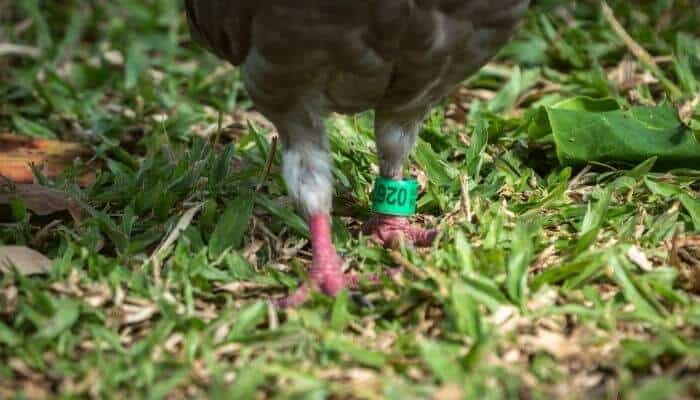
It will either have a date and the initials of the organization that ringed it or the initials of the racing organization that the owner of the bird belongs to.
It’s easy to find out which using the internet.
The tagging organization may offer advice on the interim care of the injured bird and the racing organization can put you in touch with the pigeon’s owner.
In the UK – contact the https://www.rpra.org/stray-reporting/
In the USA – contact https://www.pigeon.org/ or https://www.npausa.com/
Who can you call if you find an injured pigeon?
If you find an injured wild pigeon (i.e. one without a tag) and feel you aren’t able to give it the level of care you think it needs, you can call your local vet.
You can also choose to call national animal welfare organizations such as
In the UK – the RSPCA emergency number is 0300 1234 999
In the USA – Pigeon Rescue will help you find the nearest appropriate contact for help. The number is (415) 851-5948

This article was written by our qualified veterinarian Cristina.
This is part of our commitment to providing you with the most trustworthy veterinary advice for your pigeons.
Conclusion
No one likes to see these lovely little birds suffer, but it is sometimes hard to know what to do for the best.
Instinctively, pigeon and bird lovers, in general, will wish to help, but not being experts or veterinarians, it is difficult to know what to do.
Although not medical advice, the steps mentioned above may well give the injured pigeon that you find a fighting chance.
Sources:
